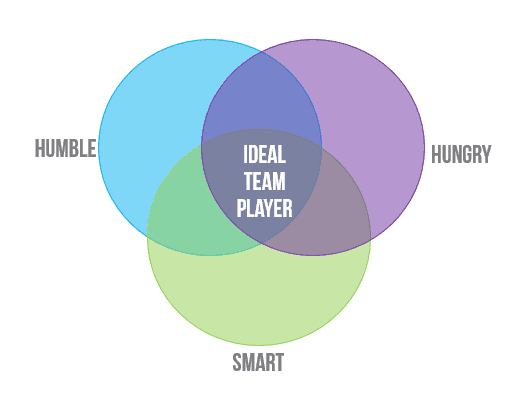Effective recruitment practices are at the heart of every successful business and as we enter a new era of post-covid people practices, taking a fresh look at how we recruit; and specifically what qualities we are looking for, has become more important than ever.
As part of our in-house professional development strategy, we recently attended a global event hosted by The Growth Faculty where we heard from Patrick Lencioni, best-selling author and leadership consultant on building effective teams and recruiting the ideal team player.
Lencioni specifically identified three “essential virtues” that define the ideal team player; humble, hungry, and smart. Having dedicated a chapter of my own book to the importance of value alignment between employees and organisations, these concepts resonated with me. From a recruitment sense, you can test for these qualities during your hiring process using some simple strategies I have shared below.

Before we get to those, let’s look at Lencioni’s three qualities of an ideal team player in more detail.
Humble
According to Lencioni, “the first and most important virtue of an ideal team player is humility. Lencioni describes a humble employee as someone who is more concerned with the success of the team than with getting credit for his or her contributions”.
If you have ever attended a networking event (or any social gathering for that matter) only to be cornered by someone who shares their every success and dominates most of the conversation, you will know that people who are largely ego-driven or attention-seeking do not form strong connections with others. For a team to work effectively, relationships within that team need to be based on trust, openness and vulnerability; all characteristics that underpin the humble team player.
Hungry
Lencioni’s describes the hungry team player as “someone with the desire to work hard and do whatever is necessary to help the team succeed”. Hungry employees actively look for opportunities to contribute to the team and do not require close supervision or management from their leader.
People who are hungry are self-motivated and like to think outside the box. Their energy and enthusiasm for work is evident and they motivate those around them to step up.
Smart
Lencioni describes this virtue as “not about being intelligent, but rather about being wise in how to deal with people”. He goes further to say that “smart employees understand the nuances of team dynamics and know how their words and actions impact others. Their good judgement and intuition helps them deal with others in the most effective way”. Emotionally intelligent employees are experts at reading the state of play and managing themselves accordingly to get the best outcomes for their team.
These three virtues work harmoniously together to create the ideal team player. According to Lencioni, “when even one of these virtues is lacking in a significant way, challenges can arise”. Therefore, it is important to ensure your recruitment practices test for each of these three qualities.
Here are some simple strategies to implement in your business:
- Conduct recruitment conversations in non-traditional settings; talking to a candidate about their personal experiences at the local café will tell you a great deal more about them than in a traditional interview setting.
- Gain multiple perspectives; be sure to have trusted leaders, advisors, and team members involved in the recruitment process. How a candidate performs in an interview conducted by a CEO or Director may differ from a casual conversation with a colleague at the same level.
- Ask specific and targeted questions to assess each of these qualities:
- Humble – what has been your biggest professional or personal failure and what did you learn from it?
- Hungry – what motivates you? What professional achievements are you most proud of and why? If you could make one change to your profession, what would it be?
- Smart – how have you been described by others in the past? What do you think your blindspots are?
- Conduct reference checks and probe around the candidate’s ability to be humble, hungry, and smart. For example, how would other colleagues describe candidate X? What new ideas did they bring to the team?
- Trust your intuition; tune in to how the candidate makes you feel during the recruitment process. Do you get a good feeling from them, or is there something that seems off? The “vibe” a candidate gives off through their non-verbal cues will give you valuable insights into their ability to be humble, hungry and smart.
Having the right hiring processes in place that assess both values and technical capability will help you to build cohesive and high-performing teams, ultimately leading to future growth and success in your business.
Nick Hedges is the founder of Resolve HR, a Sydney-based HR consultancy specialising in providing workplace advice to managers and business owners. He recently published his first book, “Is Your Team Failing Or Kicking Goals – Take control of your people and their performance”. It is a practical Response to the most pressing HR challenges, which can be found at https://resolvehr.com.au/.
Disclaimer: The contents do not constitute legal advice and does not cater for individual circumstances. The information contained herein is not intended to be a substitute for legal advice and should not be relied upon as such.
Article reference: Lencioni, P (2016). The Ideal Team Player: How to Recognize and Cultivate the Three Essential Virtues (Jossey-Bass).
